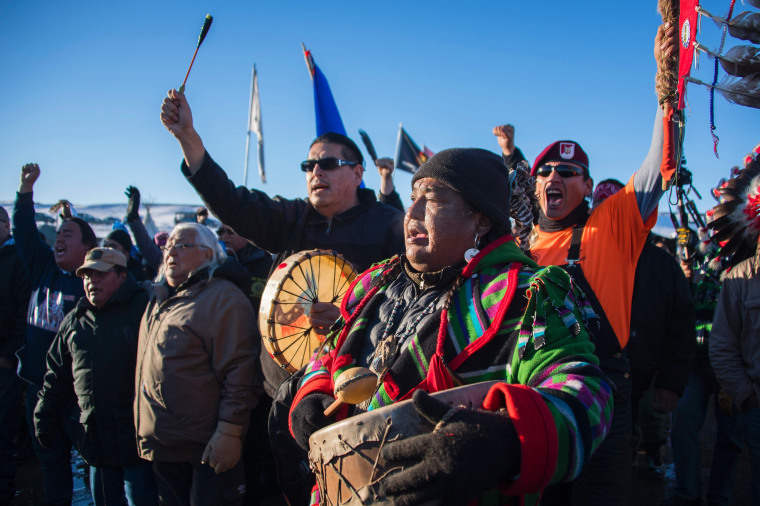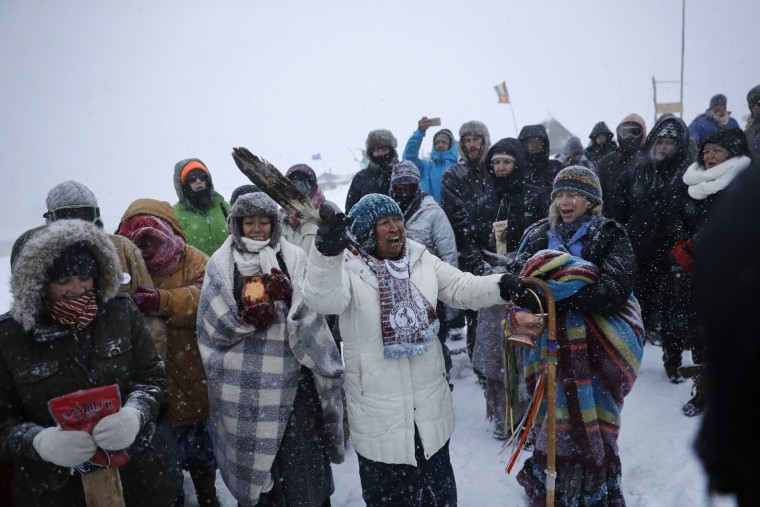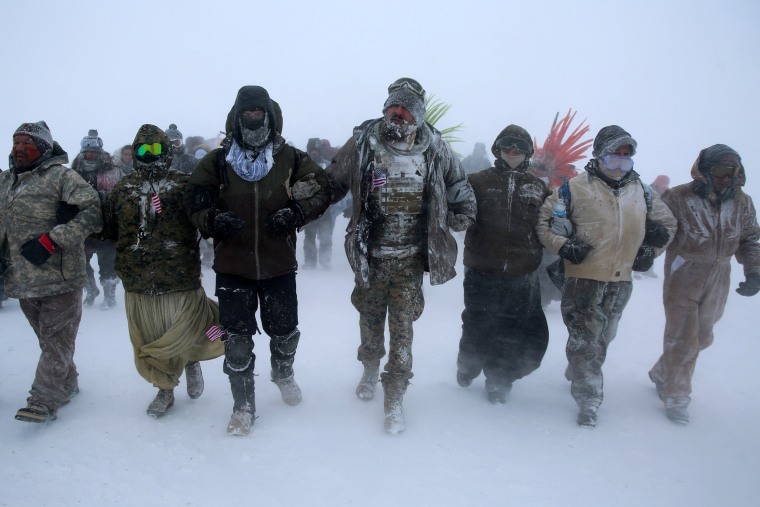Protesters against the controversial Dakota Access Pipeline have expressed dismay at a new slate of bills proposed this week by North Dakota's Republican-led and largely oil-friendly state legislature that, if passed, could potentially upend their months-long protest movement.
The bills, motivated by residents' frustration with the ongoing protests in the southern part of the state where the Oceti Sakowin camp is located, would make it a crime for adults to wear masks at protests — similar to the law that lasted for nearly 50 years that was aimed at the Ku Klux Klan — and exempt a driver from liability if they unintentionally injure or kill a pedestrian obstructing traffic on a public road or highway.
Another bill would require the state's attorney general to sue the federal government to help cover some of the more than $22 million in state law enforcement costs incurred since the protests over the $3.7 billion pipeline began in August 2016. Critics say the project threatens ancestral Standing Rock Sioux land and the water supply.
Related: Dakota Protesters Say Belle Fourche Oil Spill 'Validates Struggle'
For Tara Houska, a Native American environmental activist who has resided at the camp since August, the bills are "a direct violation of our First Amendment rights."
"It's shocking to see legislation that allows for people to literally be killed for exercising their right to protest in a public space," said Houska, National Campaigns Director for Honor the Earth, a nonprofit organization focused on raising awareness and financial support for indigenous environmental justice.
"These [bills] are meant to criminalize the protests with no real concern for constitutional law," she said.
North Dakota State GOP Chairman Sen. Kelly Armstrong said the measures were in response to constituents' concerns that the protests over the pipeline were becoming a permanent disruption to their lives.
The bills were drafted without consultation with the Standing Rock Sioux Tribe, whose reservation sits a half mile from the site of the proposed pipeline, Standing Rock Sioux Chairman Dave Archambault II said.

"The state claims they want to work closely with the tribe on repairing our relationship with them," Archambault told NBC News. "Clearly that is not happening when legislation that impacts us is being drafted without consultation, consent or even basic communication."
The proposed legislation comes at a precipitous time for a national protest movement of environmental and Native American activists that won a reprieve last month when the U.S. Army Corps of Engineers denied Energy Transfer Partners — the Dallas-based company funding the project — a permit to cross the Missouri River.
Related: Despite Victory, Dakota Access Protesters Wary of Future
Last week, Republican Sen. John Hoeven — who represents the state and is a major supporter of the 1,172 mile pipeline — was named Chairman of the U.S. Senate Committee on Indian Affairs.
Those protesting the pipeline, who call themselves "water protectors," saw the move as an insult to Indian Country, said Allison Renville, an activist from the Lakota nation.
"This is a really scary time for Indian Country," Renville told NBC News. "To have such an avid supporter of the oil industry who has consistently stated his support for extractive industry projects on Native lands named to the position as chairman is akin to stepping on our sovereignty."

Hoeven, one of the Senate's most ardent supporters of the oil industry, said he would use his new position to pass legislation that "helps improve the lives of people across Indian Country."
In a statement to NBC News, the senator said the Indian Affairs Committee did not have the authority "to approve or deny the Dakota Access pipeline" and that the ultimate decision would lie with the Corps and with a future President Donald Trump.
"While I do support the project, I believe we can work to improve the permitting process going forward so that tribes feel they have had adequate input before decisions are made and we don’t find ourselves in a similar position in the future," Hoeven told NBC News.
Members of the Standing Rock Sioux tribe see the pipeline as both an environmental and cultural threat to their homeland. They say an oil spill would permanently contaminate the reservation's water supply and that construction of the pipeline would destroy sacred sites where many of their ancestors are buried.

